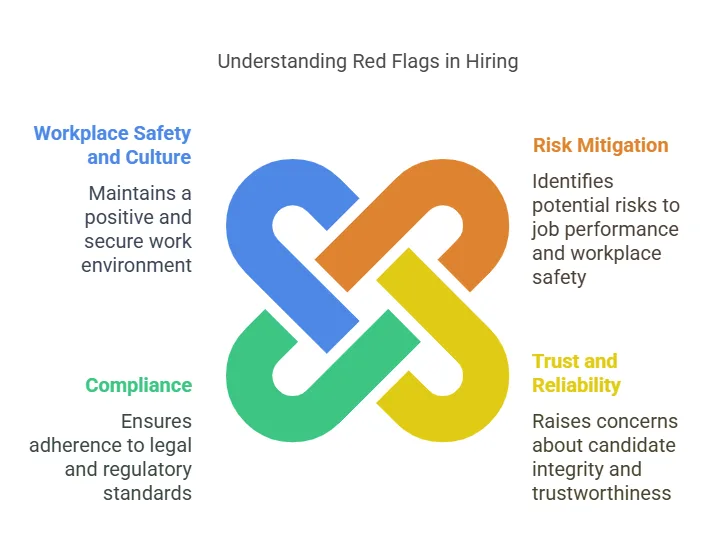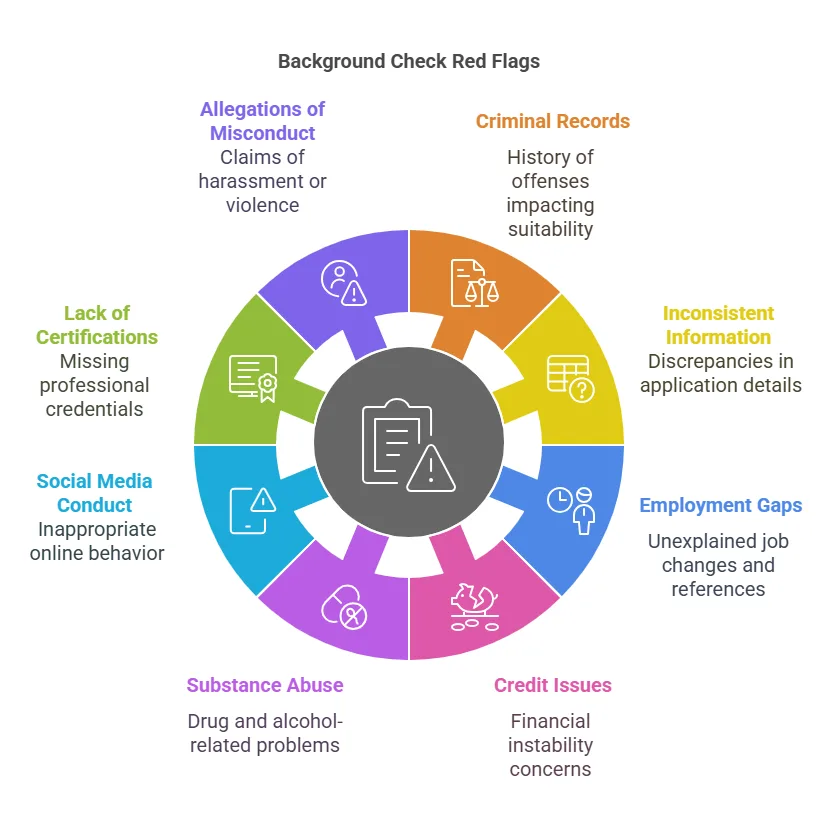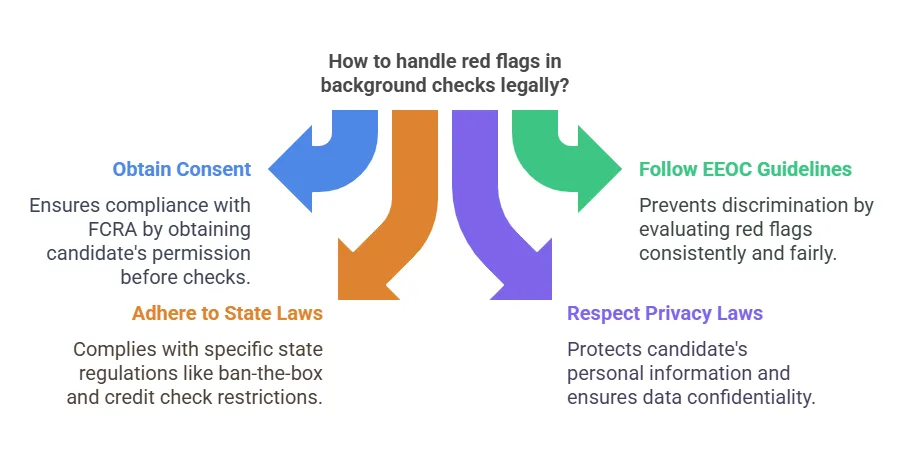How to Understand Red Flag in Background Checks

Introduction & Understanding Red Flags in Background Checks
In the hiring process, background checks are essential for ensuring that candidates are trustworthy, reliable, and qualified for the position at hand. However, there are instances when certain pieces of information found during a background check can raise concerns for employers. These concerns are often referred to as red flags. But what exactly does a red flag on a background check mean? Why are they important in the hiring process? And what are the most common causes of red flags?
In this article, we’ll dive deep into the concept of red flags in background checks, explore why they matter, and discuss the factors that can trigger them. We will also look at the broader implications of these red flags in hiring decisions and provide helpful insights on how to manage them effectively.
What is a Red Flag on a Background Check?
A red flag on a background check refers to any information that raises doubts about a candidate’s qualifications, reliability, or integrity. These flags may not automatically disqualify a person from being hired, but they signal potential concerns that employers must carefully review before making a final decision.
A red flag can be a specific detail that contradicts what was provided in the job application, an event from a candidate’s past that may be concerning for the role, or any discrepancies that raise questions about the candidate’s honesty or trustworthiness. These red flags serve as indicators to employers that something in the candidate’s history may warrant further investigation.
Why Are Red Flags Important in Background Screening?

Red flags play a crucial role in background screening because they highlight areas of potential risk, which employers need to consider before making a hiring decision. Here’s why red flags matter:
- Risk Mitigation: A red flag could indicate potential risks related to criminal behavior, dishonesty, or financial instability. These risks could affect the candidate’s ability to perform their job effectively or even jeopardize the security and safety of the workplace.
- Trust and Reliability: Employers need employees they can trust. A red flag could raise concerns about a candidate’s integrity, which could make it harder for the employer to trust them with sensitive company data or responsibilities.
- Compliance: In some cases, employers are legally required to check certain aspects of a candidate’s background to ensure compliance with industry-specific regulations (e.g., healthcare, finance). A red flag may indicate that the candidate does not meet these necessary qualifications or legal standards.
- Workplace Safety and Culture: Some red flags, such as a history of workplace violence or unethical behavior, can signal a risk to the overall safety and culture of the organization. Identifying these early in the hiring process helps maintain a positive and secure work environment.
Common Reasons for Red Flags in Background Checks

Several factors can lead to red flags during a background check. While each of these factors does not necessarily mean that a candidate should be disqualified, they must be carefully examined. Here are some of the most common causes of red flags in background checks:
- Criminal Records: Criminal convictions are one of the most well-known red flags. Employers typically conduct criminal background checks to assess whether a candidate has any history of offenses that might impact their suitability for the role. While some criminal offenses may be more concerning than others, all criminal records warrant attention.
- Inconsistent or Discrepant Information: Inconsistencies between what the candidate provides on their application or resume and what the background check reveals can be a red flag. This might include discrepancies in dates of employment, educational qualifications, or job titles. Dishonesty about previous positions or qualifications can raise doubts about the applicant’s integrity.
- Employment History Gaps or Job Terminations: Frequent job changes, unexplained employment gaps, or poor references from previous employers can also trigger red flags. Employers may wonder why the candidate has a history of unstable employment or if there are underlying reasons for the terminations that haven’t been addressed.
- Credit Issues: For positions that involve financial responsibilities, a candidate’s credit history might be a critical part of the background check. A poor credit history or signs of financial instability, such as bankruptcy or excessive debt, could be concerning to employers, especially if the role involves handling money or sensitive financial information.
- Drug or Alcohol Problems: Drug and alcohol abuse issues that are uncovered through background checks or drug testing may be a red flag, particularly for roles that require attention to detail, heavy equipment operation, or safety-sensitive tasks.
- Social Media and Online Presence: In the digital age, employers often check social media accounts to gauge a candidate’s behavior outside the workplace. Offensive or inappropriate posts, discriminatory language, or evidence of unprofessional conduct can serve as red flags.
- Lack of Professional Licenses or Certifications: For jobs that require specific certifications or licenses, failing to verify such credentials during a background check may raise concerns about the candidate’s qualifications for the role. This can be especially relevant in fields such as healthcare, law, and finance.
- Substance Abuse or Violations: In certain industries (like transportation or healthcare), background checks might include drug screening. A history of substance abuse or failing a drug test can lead to red flags, particularly in safety-sensitive roles.
- Sexual Harassment or Workplace Violence Allegations: Allegations or accusations of misconduct, especially related to harassment or violence, can be a significant red flag, as these can have a direct impact on workplace dynamics and safety.
- Inconsistent References: When a background check includes contacting references, discrepancies between what a candidate’s references say and the candidate’s claims on their resume can indicate potential issues.
Step-by-Step Analysis of the Most Common Causes of Red Flags
- Criminal Convictions
A criminal record is one of the most significant red flags that can be found in a background check. Depending on the nature of the crime, it can either disqualify a candidate immediately or raise serious concerns that need to be addressed. Employers often view criminal convictions in different ways depending on the role, the severity of the offense, and how much time has passed since the conviction.
How it affects hiring decisions:
- Severity of the crime: For example, a violent crime or fraud conviction may be seen as a disqualifying factor for roles that require trust and integrity, such as in healthcare, finance, or law enforcement.
- Time elapsed: Some employers may be more lenient if the crime occurred many years ago, especially if the candidate can demonstrate rehabilitation.
- Relevance to the position: A non-violent offense or a crime unrelated to the job responsibilities may be seen as less impactful, but it will still need to be evaluated in the context of company policy and the type of work involved.
Action to take: If a criminal record is found, employers typically consider whether the crime is relevant to the job. They may also provide the candidate with an opportunity to explain the circumstances, especially if the offense occurred some time ago. Employers should avoid making assumptions and adhere to Fair Chance Hiring policies where applicable.
- Inconsistent or Discrepant Information
Inconsistent information between what a candidate states on their resume or job application and what is revealed through a background check can be a serious red flag. This could involve discrepancies in employment dates, job titles, responsibilities, or educational qualifications.
How it affects hiring decisions:
- Trustworthiness: If a candidate lies about their qualifications or work history, it undermines their credibility and trustworthiness. Employers may view dishonesty as a sign of potential issues in the future, such as falsifying reports or misrepresenting performance.
- Role suitability: Discrepancies in information may also indicate that the candidate is not transparent, or that they lack the skills or experience they claim to have. Employers often value honesty and transparency above all else in the hiring process.
Action to take: Employers should reach out to candidates to clarify any discrepancies. This also includes verifying employment history, checking references, and requesting documentation that supports the claims made by the candidate. While minor errors or honest mistakes can occur, significant inconsistencies may lead to disqualification.
- Employment Gaps and Frequent Job Terminations
An unexplained employment gap or frequent job changes might be a red flag for employers, as it could indicate instability or difficulty in maintaining long-term employment. It’s important to examine the context of these gaps or terminations to understand the reasons behind them.
How it affects hiring decisions:
- Job stability: Employers may view frequent job changes as a sign that the candidate lacks commitment or may leave the company shortly after being hired. They may also question whether the candidate is hard to work with, which could lead to a negative impact on team dynamics.
- Reason for termination: If a candidate was frequently terminated from previous jobs, employers may wonder whether there were performance issues, personality conflicts, or behavioral problems that contributed to those terminations.
Action to take: Employers should ask candidates about the reasons behind their employment gaps and terminations during the interview. If the reasons are legitimate (e.g., family care, personal health, career transition), they may be more understanding. However, if the reasons are related to poor performance, behavioral issues, or conflicts, it may raise concerns.
- Credit Issues
A poor credit history can raise red flags, especially for positions involving financial responsibilities or access to sensitive company information. Many employers conduct credit checks as part of the background screening process to assess the candidate’s financial responsibility and trustworthiness.
How it affects hiring decisions:
- Financial trustworthiness: A poor credit score, history of debt, or bankruptcy may suggest that the candidate is financially irresponsible, which could potentially lead to issues like embezzlement or fraud.
- Role relevance: Employers in roles involving financial oversight, handling funds, or managing sensitive financial data (e.g., accounting, banking, or managerial positions) will consider credit issues more seriously, as they directly affect the candidate’s ability to handle financial matters.
Action to take: Employers should evaluate the context of the credit issues and the relevance to the role. Candidates may have had financial setbacks that were beyond their control, such as medical emergencies, which would not necessarily disqualify them. It’s important to take a holistic view and provide candidates with the opportunity to explain their situation.
- Drug or Alcohol Problems
A history of substance abuse or recent drug or alcohol issues can be flagged during background checks, especially when a drug test is part of the screening process. In safety-sensitive roles or industries where precision and focus are critical, drug or alcohol problems can severely impact performance.
How it affects hiring decisions:
- Safety concerns: For positions that require operating heavy machinery, driving vehicles, or handling hazardous materials, drug and alcohol issues can pose a significant safety risk.
- Work performance: Employers may be concerned about the candidate’s ability to maintain productivity and focus if they have a history of substance abuse.
Action to take: Employers should consider the timeline of any substance abuse issues and whether the candidate has undergone rehabilitation. In some cases, employers may choose to provide opportunities for recovery, especially if the individual can demonstrate commitment to overcoming their past challenges.
- Social Media and Online Presence
In the digital age, a candidate’s social media presence can also be a red flag. Many employers now search for social media profiles to gain insight into a candidate’s personality and behavior outside of the professional sphere. Inappropriate content, offensive language, or unprofessional behavior can raise concerns about how the candidate might represent the company.
How it affects hiring decisions:
- Professionalism: If a candidate engages in online behavior that is offensive or unprofessional (e.g., posting inappropriate content, discriminatory remarks, or illegal activities), it can negatively affect the employer’s brand and reputation.
- Cultural fit: Employers want to ensure that candidates align with company values and the organization’s culture. Inappropriate online behavior can suggest that a candidate may not be a good cultural fit.
Action to take: Employers should carefully review the candidate’s social media presence and look for any red flags. However, they should also avoid basing hiring decisions solely on social media, as people can change, and context matters.
How Precise Hire Can Help Employers Handle Red Flags
At Precise Hire, we offer comprehensive background screening services designed to help employers navigate red flags and make informed, compliant hiring decisions. Our services streamline the background check process, ensuring that employers receive accurate, detailed reports to assess candidates effectively. By leveraging our platform, you can ensure that your company makes the right hiring decisions while maintaining compliance with laws and regulations.
Legal Aspects of Red Flags in Background Checks

When conducting background checks, it is crucial for employers to comply with relevant laws and regulations. This ensures that the hiring process is fair and that candidates’ rights are protected. There are several key legal considerations related to red flags in background checks:
1. Fair Credit Reporting Act (FCRA)
The Fair Credit Reporting Act (FCRA) is a federal law that regulates the collection, dissemination, and use of consumer information, including background checks. The FCRA ensures that employers obtain candidates’ consent before conducting background checks and that the information obtained is used responsibly.
- Consent: Employers must obtain written consent from the candidate before running a background check. This is required for any background screening that includes credit reports, criminal history, and other personal information.
- Adverse Action Notification: If a background check reveals a red flag that leads to an adverse employment decision (e.g., rejecting a candidate), the employer must notify the candidate. This includes providing a copy of the background check report and a notice of the candidate’s right to dispute any inaccuracies.
2. Equal Employment Opportunity Commission (EEOC) Guidelines
The EEOC enforces federal laws that prohibit employment discrimination. When evaluating red flags, employers must ensure that they do not discriminate against candidates based on protected characteristics, such as race, color, religion, sex, disability, or national origin.
- Criminal Record Considerations: The EEOC has provided guidance on how employers should handle criminal records in background checks. Employers are advised to consider the nature of the offense, how much time has passed since the conviction, and the relevance of the offense to the job. Employers must ensure that the use of criminal records does not disproportionately affect individuals of certain racial or ethnic groups, unless there is a clear, job-related reason for the disqualification.
- Consistency: Employers should apply background check policies consistently for all candidates to avoid claims of discrimination. This includes ensuring that red flags such as criminal history or financial problems are evaluated impartially, regardless of the candidate’s protected characteristics.
3. State and Local Laws
In addition to federal regulations, there may be state-specific laws that govern background checks. Some states have enacted laws that provide additional protections for candidates, such as:
- Ban-the-box laws: These laws prevent employers from asking about criminal history on initial job applications. Employers may only inquire about criminal records later in the hiring process, typically after a conditional offer of employment has been made.
- Credit Check Restrictions: Some states restrict the use of credit reports for employment purposes, particularly for jobs that do not involve financial responsibilities. Employers in these states must be aware of such restrictions and adjust their background check practices accordingly.
- State-specific criminal history restrictions: Some states place limits on how far back an employer can look into a candidate’s criminal history. Employers should be aware of these limitations to ensure compliance with state law.
4. Privacy Laws
Employers must also respect candidates’ privacy rights when conducting background checks. This includes handling personal information with care, ensuring that it is kept confidential, and only using it for the purpose of hiring decisions.
- Data Protection: Employers should ensure that they comply with data protection regulations, such as the General Data Protection Regulation (GDPR) for candidates based in the European Union or the California Consumer Privacy Act (CCPA) for candidates in California.
- Transparency: Employers should be transparent with candidates about what information is being collected and how it will be used. Candidates should be aware of their rights to access, correct, or challenge the information in their background check reports.
FAQs: Frequently Asked Questions About Red Flags in Background Checks
Can I be disqualified from a job based solely on a red flag in my background check?
No, a red flag alone is not an automatic disqualification. Employers are required to consider the relevance and context of the red flag. For example, a criminal conviction might not disqualify a candidate if it occurred many years ago, if the candidate has shown evidence of rehabilitation, or if the conviction is unrelated to the job. Employers must also give candidates the opportunity to explain any red flags before making a final decision.
What should I do if I find an error in my background check report?
If you find an error in your background check report, you have the right to dispute the information. Under the FCRA, you should contact the background screening company and provide documentation to correct the mistake. The company is required to investigate the dispute and make any necessary corrections.
How far back do background checks go?
The length of time a background check goes back depends on the type of check and the laws governing it. For criminal background checks, the period may vary by state or the employer’s policy, but typically, it can go back 7 to 10 years. For employment history and education verification, background checks may cover the past 5 to 10 years, but this also depends on the company’s policies.
Can I be hired if I have a red flag in my background check?
Having a red flag in your background check does not automatically disqualify you from being hired. Employers are required to evaluate the red flag in context. For instance, a minor infraction or an issue that occurred years ago may not significantly impact your hiring decision. Employers also take other factors, such as your qualifications and work history, into account.
How can I improve my chances of overcoming red flags in my background check?
If you have a red flag, be proactive and transparent. Explain the circumstances surrounding the issue and show how you have learned or grown from the experience. For example, if you have a criminal record, you might highlight any rehabilitation programs or community service you have completed. Demonstrating that you are a responsible, trustworthy individual can go a long way in overcoming a red flag.
Conclusion: Key Takeaways and the Importance of Thorough, Compliant Background Checks
Background checks are an essential part of the hiring process, helping employers assess candidates’ suitability for roles and ensuring that they make informed decisions. Red flags in background checks are indicators of potential concerns, but they should be evaluated carefully and in compliance with relevant laws, including the FCRA, EEOC guidelines, and state-specific regulations.
While red flags such as criminal convictions, discrepancies in employment history, and credit issues can raise questions, they do not automatically disqualify a candidate. Employers should consider the context and relevance of these flags and give candidates an opportunity to explain. By maintaining a compliant and fair background screening process, employers can ensure they are making the right hiring decisions while respecting candidates’ rights.
At Precise Hire, we understand the importance of thorough background checks and offer services that help employers navigate red flags and comply with all legal requirements. By using our platform, employers can streamline the background check process and make informed, compliant hiring decisions.
